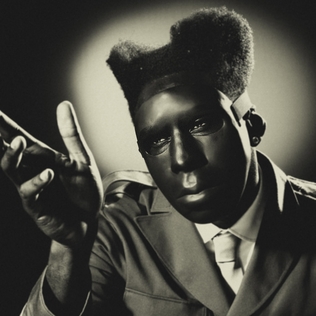
Photo Courtesy of Tyler, the Creator
Tyler, the Creator released his eighth studio album “Chromakopia” on Oct. 28, 2024. With 14 tracks running 53 minutes, this album is arguably Tyler’s most serious project to date.
It showcases his dynamic personality, inner conflicts, and insecurities with transparency and beauty.
The sound and production of “Chromakopiaha” involves severe tonal whiplash at times. However, I don’t think it’s to the album’s detriment.
In fact, I think the emotional highs and lows of the album create a sense of balance, further showing just how well-rounded of an individual Tyler is with his artistic expression.
While a handful of tracks mainly utilize the synthesized sounds found in “Igor,” most of the album features a mix between that and more acoustic instruments.
Many tracks strike a wonderful balance between both traditional and electric piano, perfectly capturing the yearning tone of the song, as well as the lowkey, depressing lyrics.
Acoustic guitar makes a few appearances throughout the album, allowing the pace to slow down at times without creating a complete tonal pocket that doesn’t fit the rest of the album.
The drums are the standout instrument throughout most of the album because of their experimental and unique sounds and cadences. They bring so much life to the songs and make otherwise simple melodies much more exciting to listen to.
“Chromakopia” is packed with heavy hitters. The album is a reflection of Tyler having almost entirely moved on from the edgy phase of his early career. Now, he has matured into a person who has very similar concerns as everyone else.
The most prominent themes of the album are identity and self discovery. This is represented in the name and the cover itself.
“Chromakopia” is a portmanteau of the words Chrome — a colored thing — and kopia — the Polish word for “copy.”
It signifies the numerous “colors,” or facets, of Tyler’s life, personality and art. That’s perfectly represented in the multitude of topics he raps about and how contradictory some of them are.
Using his love life and the prospects of parenthood as an example, Tyler juggles back and forth between the pros and cons of settling down and having a family.
Tyler is unwilling to subscribe to the culture of monogamy that most people are familiar with. He expresses his frustrations with his commitment issues and how they impact his intimate relationships.
In a similar vein, he feels pressure from his social circle and his mother to start having children. That decision also comes with the possibility of putting his career on hold, as well as his other goals and aspirations.
With both examples, Tyler is torn between missing out on all the general markers of adulthood and giving up his freedom and happiness for the sake of conformity.
That same conflict can be observed in the way he discusses his upbringing. This is most present in one of my favorite tracks: “Take Your Mask Off.”
Despite his music gaining much more mainstream popularity in recent years, Tyler has always existed in this state of cultural limbo between being “too Black” and “too white.”
This includes having certain hobbies, passions and interests that don’t fit within the stereotypical monolith of what Blackness should be. “Take Your Mask Off” is a perfect reflection of what existing in that state of limbo feels like.
The first verse of the song tackles his struggles with being a Black boy that doesn’t conform to the stereotype of what a Black man is “supposed” to be in Hip-Hop. The second verse is him expressing his religious guilt and internalized homophobia.
It opens the audience to Tyler’s feelings of rejection and doubt regarding his self-esteem and image. It has the ability to resonate with millions of people who grew up in very similar situations.
Befitting of the album’s name, “Chromakopia” refuses to adhere to one specific style.
Hip-Hop still does have a lot of specific imagery and stereotypes that are associated with the culture and craft, but it’s albums like Chromakopia that are slowly pushing back on what the culture should look like and how people within it are allowed to navigate.
Score: 8/10